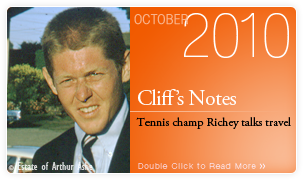Cliff’s Notes | Tennis champ Richey talks travel
How many places and countries did you visit through tennis?
I never visited any of the Iron Curtain countries because of the Cold War, but all of the major countries of Western Europe. I also went all over South America, the Caribbean, Asia. South Africa and Namibia were really the only places in Africa.
What were your favorite and least favorite courts to play on, in terms of the facilities and atmosphere?
One of my least favorite was the old court in Cleveland, OH. At the time, that stadium was a good distance away from the court, it wasn’t enclosed at all and it felt like were playing on a football field. Another one was Rome, for much the same reason. It had lots of excess room around the court, so your perception is different and it’s hard to orient yourself on the court. One of my favorites is the old Forest Hills stadium, where they used to hold the U.S. Open. I liked that it was intimate. When playing there I felt very protected and enclosed. Also, I prefer the surface there. American clay—or Har-Tru—was always my favorite surface to compete on, followed by European clay.
What do you see as the biggest changes between when you were on the tour and now?
Mainly, everything has gotten bigger, and better in every way. Arenas and facilities now are tremendous: when I used to play Cincinatti, the stands used to be 600 or 800 people. Last month I was there, and it’s a 12,000-person arena! Nowadays, there’s much more attention, more TV coverage. I always wanted the sport to get more notice and love that the game has grown: I think the players are better athletes, I think some of the techniques have gotten better in many ways. Also for the players, the money is better so they don’t have to play as many events now. I used to play 26-36 tournaments a year, cause it was the only way to support yourself.
What were the difficulties of such a nomadic lifestyle?
Well, I’d play so many weeks in a row, that I’d wake up and not know where I was. But I mean, I loved the travel, and I still like to travel. It really was a privilege to see the world—it could seem like a chore at times—but you still recognize that it’s a privilege that very few people get to do. You don’t see as much as you like, but sometimes, amazing things happen.
One year I had just finished a book by Dr. Christiaan Barnard, the South African doctor who performed the first successful heart transplant, while I was traveling to South Africa. I was in Johannesburg and during a match I was look up and see him in the VIP section. Normally, I would not have recognized this guy, but having just finished his book, which was fascinating, I had many questions and wanted to talk to him. So once I got off the court, I found him and asked him all about the book. Since he had a tremendous ego, he was more than happy to talk with me and actually ended up inviting my wife and me to come stay with him and his wife in Cape Town so they could show us around. I asked at the tennis club, and had some days off so we decided to go. Apparently, he had a habit of meeting people and then inviting then to come visit and then sending his assistant to come pick them up from the airport. Apparently the assistant was not happy about this, so he told me to pretend I was a medical student coming to check out the program. Well almost immediately, after his assistant asked me a few questions, it became quite clear that I knew nothing about medicine and was not in medical school. But still, I had a wonderful time. My wife and I got scrubbed down and got to watch a live open heart surgery on a young boy who had a hole in heart, right in front of us, up close. They didn’t even have a glass partitioning the area back then. The experience was very special.
To hear more about his travel experiences and life in tennis, check out Cliff Richey’s book, Acing Depression: A Tennis Champion’s Toughest Match, available in bookstores and at online retailers.

